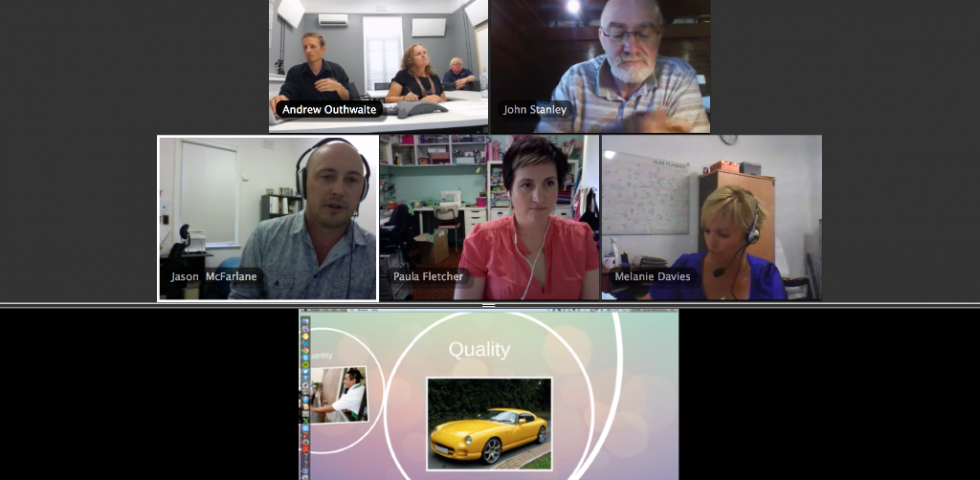An incredible amount of discovery and learning can happen in an hour, when talking with well-informed professionals who care. Tuesday’s online panel explored the benefits, definitions, strategies and policies of buying and eating ‘local’.
This post is a short report on some of the outcomes from the ‘We Love Local?’ panel discussion from Tuesday 11th March.
The panellists (who’s full bios are on the event page) included John Stanley (retail consultant), Jason McFarlane (economist), Paula Fletcher (graphic designer), Melanie Davies (business development professional) and facilitated by Jo Blayney (coach and consultant). Andrew Outhwaite (social entrepreneur) also pitched in with a few questions and ideas, as did Barry Anderson (radio station manager) with other participants listening in locally and from other parts of WA.
Each of the speakers was very well-informed in their area of expertise, bringing insights from the psychology of individual face-to-face interactions with local, independent retailers as well as an understanding of the national and global trends in urban planning and online retail.
Jo’s facilitation enabled some really well-considered and open conversations on a range of topics, from definitions of local to the upsides of having multinational corporations set up in your main street and whether where you buy your kebabs late at night really matters.
Below are some highlights and insights that were all mentioned in the closing comments from panellists.
If you are passionate or affected by this topic, don’t forget to register for the workshop on 25th March and complete the survey (there are prizes on offer if you do).
- The value of understanding the different ‘quality’ and ‘quantity’ factors affecting ‘transactions’, which Jason McFarlane presented on and later wrote about on the Pracsys blog.
- An example of this is comparing the rich, multi-dimensional high-quality experience of getting a coffee from a place where you know you’ll see friends there, love the furniture and trust that the owners are doing their ethical best for the community, with the low-cost, high-speed experience of a drive-thru coffee from a multinational franchise.
- Defining ‘local’ by distance, postcode, or travel-time and whether the thing that’s ‘local’ are the materials and products themselves or simply the shopfront they’re sold from.
- For example, consider that buying locally-grown vegetables from the Railway Market and buying an imported Toyota from a local dealer (rather than one in Perth) could both be considered equally ‘buying local’ by some definitions.
- Understanding ‘why’ we would care about buying or eating local is so critical for designing any intervention or campaign. Is our motivation financial self-interest and growing the local economy, or is it because we believe that better social and ecological outcomes will result? And how do we asses the relative merits of the ecological, cultural, social and economic impacts of our choices?
- Consider the dilemma of where to buy your late-night snack. Which has greater merit: the startup local independent kebab shop staffed by the owners with the food made in front of you, the multinational franchise with high and transparent social and environmental standards for its mass-produced burgers, or the new Australian-owned franchise that donates a meal to a developing country for every one you buy?
- The ability to tell the local story came up as being an essential skills retailers and suppliers, as so many of them contribute time and money to local social and charitable projects.
- However through the discussion it emerged that many local businesses are reluctant to make their contributions to the local charities and clubs known, because to them it’s the right thing to do, and they also may want to avoid being swamped by requests for more donations and contributions should word get out
- Ground-up collaborative that demonstrate smart thinking, good design and collaboration amongst different organisations and sectors seem to get the most traction.
- Campaigns like ‘We Love KB‘, Totally Locally and the events and art in the West End of Geraldton’s Marine Tce are all examples where a broad alliance of people and organisations have acted collectively, creatively and intelligently to influence buying habits.
- Government and corporate procurement policies make a difference.
- Examples from Karara Mining, City of Greater Geraldton and others demonstrating it possible, beneficial and sustainable to preferentially procure from locally-owned or run suppliers, and even more so when those suppliers are social enterprises who are directly achieving local social outcomes.
- Local can be about banking, comedy, design and so much more than retail.
- In almost every industry you can see that local organisations are competing with global players as you may choose to do your banking purely online rather than support a local community-based bank, source graphic design from across the world rather than your local creative talent, and even choose whether to support local artistic and comedic talent instead of traveling to Perth for laughs.
—
This blog post was written by Pollinators Executive Officer Andrew Outhwaite















No comments yet.